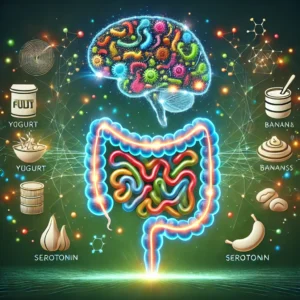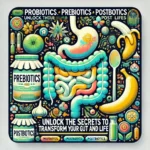Did you know your gut and brain are constantly in conversation? This connection, known as the gut-brain axis, is a two-way communication system that links your digestive system and central nervous system. Your gut microbiome, the trillions of microbes in your digestive tract, plays a pivotal role in shaping this interaction. Understanding this connection can unlock the secrets to improved mental health, reduced stress, and enhanced well-being.
What is the Gut-Brain Axis?
The gut-brain axis is the biochemical signaling pathway between your gut and brain. It involves:
- Vagus Nerve: A primary highway connecting the brain and gut.
- Microbial Metabolites: Compounds produced by gut bacteria that influence brain function.
- Hormones and Neurotransmitters: Serotonin, dopamine, and GABA are regulated by gut microbes.
Fact: Over 90% of serotonin, the “feel-good” neurotransmitter, is produced in your gut【1】.
How Gut Microbes Affect Your Mental Health
- Mood Regulation:
Beneficial bacteria like Lactobacillus and Bifidobacterium produce serotonin and GABA, which help regulate mood and reduce anxiety.- Study: A 2021 study found that individuals who consumed probiotics reported lower stress levels and improved mood【2】.
- Cognitive Function:
Microbial diversity correlates with better memory and focus.- Example: Foods rich in omega-3s and prebiotics, like walnuts and asparagus, enhance gut health and cognitive function【3】【4】.
- Stress Management:
Stress disrupts gut microbes, leading to inflammation and reduced microbial diversity. This can worsen anxiety and depression.- Fact: A 2020 review in Nature highlighted the link between stress-induced dysbiosis and mood disorders【5】.
Signs of a Poor Gut-Brain Connection
- Frequent mood swings or irritability
- Brain fog or difficulty concentrating
- Anxiety or depression
- Digestive discomfort like bloating or constipation
Tips to Improve the Gut-Brain Axis
- Incorporate Fermented Foods
Probiotic-rich foods like yogurt, kimchi, and kefir support gut health and mood regulation.- Study: A 2019 study found that fermented foods significantly reduced anxiety symptoms in young adults【6】.
- Eat Prebiotic-Rich Foods
Prebiotics, found in garlic, onions, and bananas, fuel beneficial bacteria.- Example: Starting your day with oatmeal and a banana boosts serotonin production.
- Exercise Regularly
Aerobic activity increases microbial diversity and reduces stress-related dysbiosis.- Fact: Regular exercise enhances the gut-brain axis by promoting the growth of Akkermansia muciniphila, a beneficial gut bacterium【7】.
- Practice Mindfulness and Stress Reduction
Techniques like yoga and meditation lower cortisol levels, which supports a healthier gut-brain connection.- Tip: Dedicate 10 minutes daily to deep breathing or guided meditation.
- Limit Processed Foods
High-sugar diets harm gut bacteria, negatively affecting mood and cognitive health.- Action Step: Replace sugary snacks with nutrient-dense options like nuts or fresh fruits.
Food Recommendations for a Healthy Gut-Brain Connection
- Probiotic-Rich Foods: Yogurt, sauerkraut, kefir, miso
- Prebiotic Foods: Garlic, onions, leeks, asparagus
- Omega-3 Sources: Salmon, chia seeds, walnuts
- High-Fiber Foods: Lentils, whole grains, fruits, and vegetables
Takeaway
Your gut and brain are intricately connected, and nurturing your gut health can transform your mental well-being. By eating a balanced diet, managing stress, and staying active, you can strengthen the gut-brain axis and enjoy a happier, healthier life.
📖 For more tips and insights, visit GoodFoodVibes.in and follow us on Instagram @goodfoodvibes.


